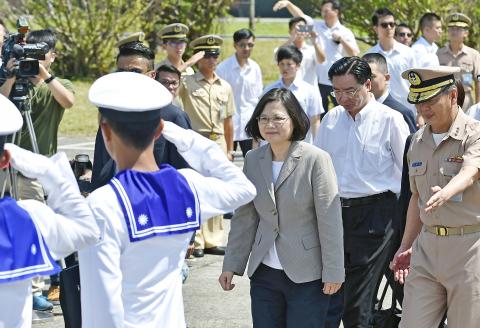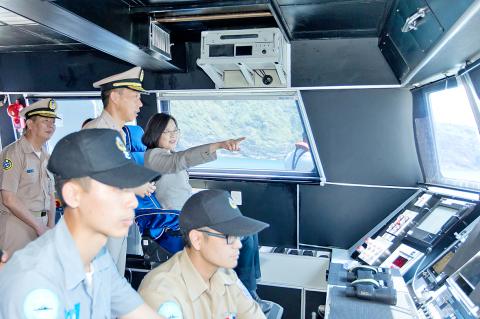President Tsai Ing-wen (蔡英文) yesterday reiterated her administration’s determination to push for a self-reliant national defense force as she spoke on board a domestically built warship off Yilan.
Following an inspection tour of air bases in Hualien on Sunday last week — the first time in her capacity as commander-in-chief of the nation’s armed forces — Tsai visited a naval base in Yilan County’s Suao Township (蘇澳) and boarded the Tuo Jiang, the nation’s first locally built stealth missile corvette that was commissioned in March last year.
She said that the nation would continue to promote a policy of building its own vessels.

Photo: SAM YEH, AFP
“In addition to enhancing naval combat capacity, it will also help the development of the shipbuilding and machinery sectors, as well as system integration,” Tsai said.
The government’s approach would be to make “demands for national defense the driving force of industrial upgrade and transformation,” Tsai said.
However, the government is bound to encounter numerous challenges in the pursuit of a self-reliant national defense force she said.

Photo courtesy of the Military News Agency
“The path is not an easy one, but there is no return,” she told officers and cadets aboard the Tuo Jiang.
She said the nation has used superior technology in the building of the Tuo Jiang and “more importantly, we have the determination to succeed.”
Tsai, accompanied by Minister of National Defense Feng Shih-kuan (馮世寬), Chief of General Staff Yen De-fa (嚴德發) and National Security Council Secretary-General Joseph Wu (吳釗燮), said it was her first time on board the Tuo Jiang, and when the vessel sailed out of Suao, she said she “was deeply touched” to see the powerful naval vessel and the beautiful Yilan coast.
Tsai said that hoisting the flag of the commander-in-chief on the ship was an honor and responsibility.
“I am privileged to be able to safeguard our homeland and marine lifeline with all of you in the navy,” she said.
Tsai also said the Tuo Jiang is a symbol of David fighting Goliath.
On Sept. 2, 1958, in one of the major sea battles in the Taiwan Strait, a naval vessel named the Tuo Jiang was shelled by Chinese ships and 11 of its 81 crew were killed, including medical officer Chen Ke-jung (陳科榮), who continued to tend to the wounded, despite his injuries, and later died of blood loss.
Tsai also said that Taiwan is surrounded by the sea, which she described as the nation’s gateway to the world, and she encouraged everyone to learn how to protect the nation’s sea lanes.
The Tuo Jiang, with Tsai and her entourage on board, made a short cruise that lasted 25 minutes.
Tsai later inspected an army base and dined with the personnel of an infantry brigade.
She said that while the base had been freshly painted, what is more important is whether the quality of equipment is good enough.
“Just painting and mowing the lawn [in anticipation of an inspection] will not make the military better,” she said, adding that the government would continue to push for national defense reforms.
A good combat force needs a good system, high efficiency and good morale, she said.
Tsai has inspected the air force, army and navy since taking office on May 20 in a show of balanced attention to the three forces.

Right-wing political scientist Laura Fernandez on Sunday won Costa Rica’s presidential election by a landslide, after promising to crack down on rising violence linked to the cocaine trade. Fernandez’s nearest rival, economist Alvaro Ramos, conceded defeat as results showed the ruling party far exceeding the threshold of 40 percent needed to avoid a runoff. With 94 percent of polling stations counted, the political heir of outgoing Costa Rican President Rodrigo Chaves had captured 48.3 percent of the vote compared with Ramos’ 33.4 percent, the Supreme Electoral Tribunal said. As soon as the first results were announced, members of Fernandez’s Sovereign People’s Party

EMERGING FIELDS: The Chinese president said that the two countries would explore cooperation in green technology, the digital economy and artificial intelligence Chinese President Xi Jinping (習近平) yesterday called for an “equal and orderly multipolar world” in the face of “unilateral bullying,” in an apparent jab at the US. Xi was speaking during talks in Beijing with Uruguayan President Yamandu Orsi, the first South American leader to visit China since US special forces captured then-Venezuelan president Nicolas Maduro last month — an operation that Beijing condemned as a violation of sovereignty. Orsi follows a slew of leaders to have visited China seeking to boost ties with the world’s second-largest economy to hedge against US President Donald Trump’s increasingly unpredictable administration. “The international situation is fraught

MORE RESPONSIBILITY: Draftees would be expected to fight alongside professional soldiers, likely requiring the transformation of some training brigades into combat units The armed forces are to start incorporating new conscripts into combined arms brigades this year to enhance combat readiness, the Executive Yuan’s latest policy report said. The new policy would affect Taiwanese men entering the military for their compulsory service, which was extended to one year under reforms by then-president Tsai Ing-wen (蔡英文) in 2022. The conscripts would be trained to operate machine guns, uncrewed aerial vehicles, anti-tank guided missile launchers and Stinger air defense systems, the report said, adding that the basic training would be lengthened to eight weeks. After basic training, conscripts would be sorted into infantry battalions that would take

GROWING AMBITIONS: The scale and tempo of the operations show that the Strait has become the core theater for China to expand its security interests, the report said Chinese military aircraft incursions around Taiwan have surged nearly 15-fold over the past five years, according to a report released yesterday by the Democratic Progressive Party’s (DPP) Department of China Affairs. Sorties in the Taiwan Strait were previously irregular, totaling 380 in 2020, but have since evolved into routine operations, the report showed. “This demonstrates that the Taiwan Strait has become both the starting point and testing ground for Beijing’s expansionist ambitions,” it said. Driven by military expansionism, China is systematically pursuing actions aimed at altering the regional “status quo,” the department said, adding that Taiwan represents the most critical link in China’s